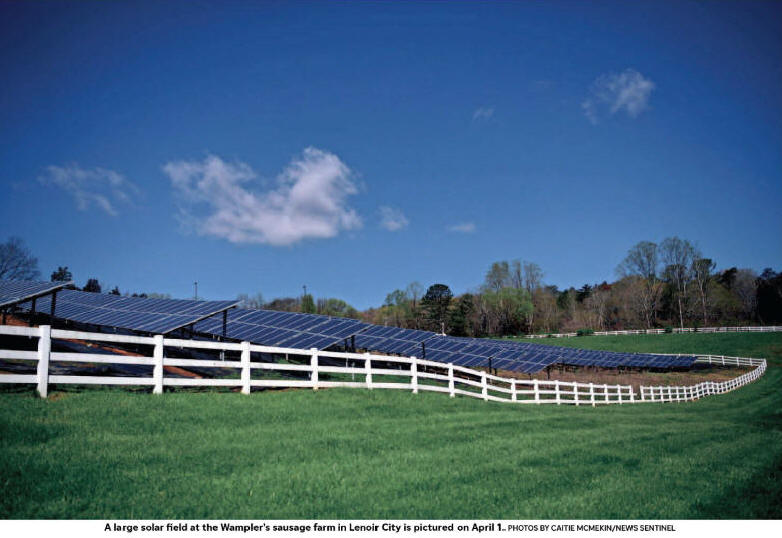Wampler's Farm's sustainability mission began with solar. Now it's about saving the world.
Brittany Crocker Knoxville News Sentinel

Wampler's Farm has been doing green energy for roughly 12 years — technically longer, if you count the farm's exclusive emphasis on pork products.
Pig farming produces less methane than cows, and nearly every part of a pig can be used for food, scientific or medical applications, Wampler's Farm president Ted Wampler explained in his office. "We believe it's our duty to make our products in the most sustainable way possible."
The farm's commitment to sustainable energy began in 2009 when it installed its first 30-kilowatt solar array.
But the investment ushered in a passion for sustainability that Ted Wampler said is the farm's new normal. Since then, he said the company has "defaulted to a culture of sustainability."
Wampler's began using recycled and recyclable packaging and reduced its water usage by installing a closed-loop, plate-chilled system to recycle the water it uses to cool down its machinery. It also treats wastewater in an on-site system and returns clean water to local utilities.
In 2017, the farm retrofitted the entire plant with energy-efficient LED bulbs and installed insulation to reduce its refrigeration costs.
Now, Wampler's Farm has installed 680 kilowatts, including a 450-kilowatt solar array at the farm and a 50-kilowatt array on the roof of Zoo Knoxville's elephant house.
But Wampler's Farm sells its solar energy to TVA to use to power the grid; it's not what powers the farm. Instead, Wampler is running off of an innovative hydrogen-power producing biomass system called the CHyP — that is, the cellulose-to-hydrogen power system.
A system to save the world
The CHyP system is in the final stages of research and development, and Wampler expects it to take the farm off-grid and net-zero. The farm will generate as much energy as it uses.
The system is the brainchild of longtime innovator and inventor Sam Weaver, the man behind Proton Power Inc. and several other successful startup companies and inventions, including the first high strength carbon fiber production furnaces, Coors' patented beer cans and the nuclear control rods used in reactors around the world.
The ChyP system produces hydrogen energy from biomass like sawgrass or wood chips obtained by controlled forestry practices. But rather than burning fuel, it uses a process called pyrolysis that creates carbon-neutral, hydrogen-rich fuel that can be used for electricity, natural gas and diesel generators.
ChyP can also run on other material like municipal waste — creating energy while converting the waste into material that is safe for landfills.
The system's only byproducts are water and biochar — a charcoal-like substance that's made by burning organic material. The CHyP system's biochar can be used as a high-yield organic fertilizer to increase food crop production.
"It is a single, sustainable solution to all the problems at the nexus of civilization," Weaver said, adding that it could prevent international resource conflicts and help slow and reverse global warming.
"It produces energy, water, increases food production, and can net out carbon from the atmosphere to reverse the threat of greenhouse gas emissions. Nothing compares to the CHyP system and what it can do for mankind."
CHyP has already garnered such international attention that the Lenoir City family farm has become a destination for delegates from around the world — even bringing together representatives from countries in conflict with each other.
Further lifesaving potential
CHyP's biochar can also be processed for one of its extremely valuable components: graphene.
Graphene is a material made up of a single layer of carbon atoms, and may be the strongest known material on earth.
It is lighter than paper, extremely conductive and 200 times stronger than steel. It also hardens into a diamond-like substance upon impact, making it a material of high interest for military defense, security and product durability applications.
Weaver has been in talks with body armor companies to make more comfortable bulletproof armor for women in the military, police and security fields.
The bulletproof applications are a passion project for Weaver because his son Sam Weaver is the mayor of Boulder, Colorado, where 10 people, including a local police officer, were killed in March.
"He has been on the national news a lot recently dealing with the aftermath of the terrible shootings that took place there," Weaver said. "Sam was a volunteer first responder for many years and was particularly distressed with the officer (being) killed."
The material's lifesaving potential fits with the farm's broad sustainability philosophy. Wampler's Farm is also home to the Ninth Judicial District's Kids First Child Advocacy Center, an intake center for abused or neglected children.
"Nothing is more important to sustain than people," Wampler said.
Wampler said his work with Weaver to introduce the CHyP system to the world is "for the good of humanity," but, that doesn't mean he's lost sight of the family business.
"It would take 100 million of these systems to power Earth, and it is not impossible to install these around the world to produce energy, water and increase crop yields," he said, laughing, and then added:
"Eventually we can bring up the standard of living everywhere so that each and every person can afford quality sausage for breakfast!"